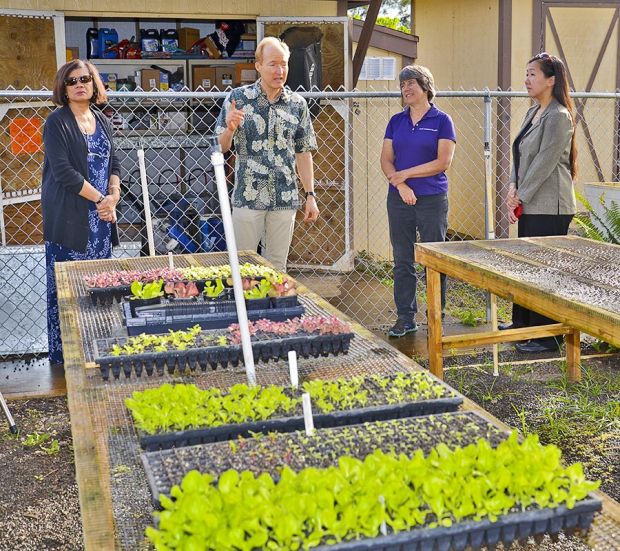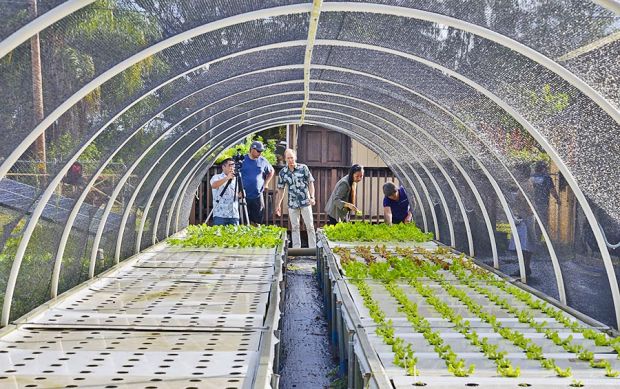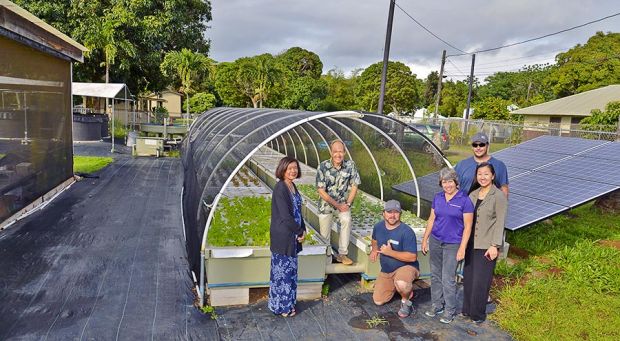PUHI — Kaua‘i Community College Chancellor Helen Cox and Erik Knutzen, director of the Ho‘ouluwehi: Sustainable Living Institute of Kaua‘i program at KCC, were excited about aquaponics Friday, but for different reasons. “John Latkiewicz (coordinator of the Kaua‘i Small Business
PUHI — Kaua‘i Community College Chancellor Helen Cox and Erik Knutzen, director of the Ho‘ouluwehi: Sustainable Living Institute of Kaua‘i program at KCC, were excited about aquaponics Friday, but for different reasons.
“John Latkiewicz (coordinator of the Kaua‘i Small Business Development Center) and I are harvesting our very first crops from our own home aquaponics system,” Cox said. “I’m so excited because we’re going to enjoy produce from our own system.”
Aquaponics is a sustainable food production system, which combines traditional aquaculture, or raising aquatic animals such as snails, fish, crayfish or prawns in tanks, with hydroponics, or cultivating plants in water, in a symbiotic environment. Aquaponics systems can vary from small indoor or outdoor units to large commercial units. Examples of both homeowner, or renter, units and a commercial-sized unit can be seen at the KCC farm.
Knutzen’s excitement stemmed from production, but instead of harvesting produce, was already harvesting energy from the rays of the morning sun, which burned away vestiges of the overnight chill Friday.
Knutzen invited representatives of the Kaua‘i Economic Development Board and KCC to hear the explanation of the photovoltaic system which, can produce sufficient energy to power the KCC aquaponics program.
A photovoltaic panel system housed near the large (commercial) grow house harvests the sun’s energy, moving to an inverter and battery backup system accommodated on one of the program’s storage sheds.
Once converted to alternating current, the power is distributed to the pumps which keep the fish tanks operating and other power needs in the program, including the smaller home version aquaponics setup similar to the one Cox has.
“KCC has just done something we’re not aware of anyone else doing within the University of Hawai‘i system,” Cox says in a news release. “We’ve connected a photovoltaic system with a battery backup system to our aquaponics program learning facility. This makes the program grid-independent and fully capable of producing its own electricity to operate its entire system.”
Knutzen said, with the battery backup, the system can produce electricity 24 hours a day, seven days a week — even during times when electricity is not available.
He said the initiative was supported, in part, by a $30,000 grant from the Kaua‘i Economic Development Board through funding provided by the Hawai‘i Department of Business Economic Development and Tourism via the state’s Act 73 and its Hawai‘i Economic Development Task Force.
“KEDB is thrilled to support renewable energy and energy efficiency field training,” said Mattie Yoshioka, KEDB president and CEO. “It is hope that projects like this will lead to more ‘green job’ opportunities here on Kaua‘i.”
Dylan DePue of DM Briggs Electric, representing DA Solar, said he had just completed certification training on the Mainland and the completion of the training enabled DM Briggs Electric to offer two additional years of warranty to the DA Solar photovoltaic system.
The installation was spearheaded by Frederick Moran, foreman for DM Briggs Electric.
“It has been an honor to work with KCC in its endeavor to provide these practical learning platforms,” DePue said. “It’s very exciting to be a part of helping in this effort to train KCC students in progressive aquaponics food production — now, with renewable energy electrical supply.”
Knutzen said with the grant from KEDB and partnering with DM Briggs Electric, the program has brought to fruition, an “off-grid” aquaponics system.
“This is a tremendous advancement for our KCC students to gain firsthand, hands-on learning experience with one of the lowest cost, highest efficiency food production methods, which, when coupled with PV and batteries, exemplify how the protein and vegetable food needs of so many can be satisfied without the need for on-grid electrical connectivity,” Knutzen said.
Cox said leading to her first home aquaponics harvest, she took the class offered by KCC through its Office of Continuing Education and Training, and with the help of her husband John, started putting together their home system.
“It was not that expensive,” Cox said. “All told, I think everything cost about $600. I was surprised at how much re-usable items were involved.”
Working between job schedules, Cox estimated the assembling process amounted to less than 40 hours.
According to the KCC OCET website, an Applied Commercial Aquaponic System Workshop course was scheduled to start Feb. 9 and run to March 23. The website also lists offerings in fundamentals of backyard aquaculture and ferrocement water tank and rainwater harvesting system with program dates to be arranged.
“I believe they’re recruiting for new classes right now,” Cox said. “But people can visit the OCET office or call them at 245-8311 for more information.”
• Dennis Fujimoto, photographer and staff writer, can be reached at 245-3681 (ext. 253) or dfujimoto@thegardenisland.com.




